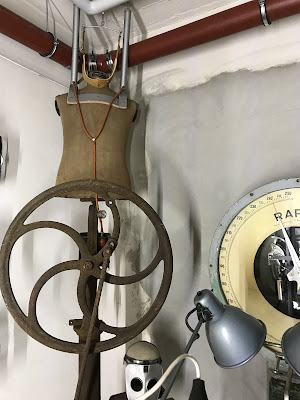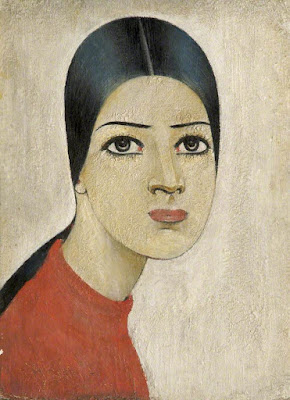Words, images and documents by or collected by Jessica Schouela
Monday, 30 December 2019
Sunday, 29 December 2019
Thursday, 26 December 2019
The Mars Room, Rachel Kushner
"The word violence was depleted and generic from overuse and yet it still had power, it still meant something, but multiple things. There were stark acts of it: beating a person to death. And there were more abstract forms, depriving people of jobs, safe housing, adequate schools. There were large-scale acts of it, the deaths of tens of thousands of Iraqi civilians in a single year, for a specious war of lies and bungling, a war that might have no end, but according to some prosecutors, the real monsters were teenagers like Button Sanchez."
Sunday, 22 December 2019
Friday, 20 December 2019
Violette Leduc, The Lady and the Little Fox Fur (1965)
"The city, despite all its flickering lights, was yielding itself up to the silence of the trees along the avenues, to the desert of the transparent cafés. In a flood of gentleness, the grey statues on the Right Bank and the grey statues on the Left Bank were all posing for the same photographer: the night. The statues were dreaming that they were smiling as the river towed past its vessels built from darkness. She was touching up her picture of Paris. A merry-go-round under a tarpaulin: the epitome of a vast city."
Thursday, 19 December 2019
Sunday, 15 December 2019
Saturday, 14 December 2019
The journey
Like reading, travel (the voyage or journey) is often a form of escapism, a new place, a new perspective, a new opportunity to embody a different version of ourselves and test it out in uncharted territory, a safe space for experimentation. The external circumstances of such journeys - the places themselves, the streets, the food, the people we encounter, but perhaps most poignantly the specific and distinct things each individual observes or notices - reflects the journeys that take place internally and the psychic work entailed in or fuelling the running away, avoiding, running towards or discovering.
Two passages from Beatlebone:
Saturday, 7 December 2019
Sunday, 1 December 2019
Saturday, 30 November 2019
Nagai Kafū, Behind the Prison (1909)
"One gains opportunities to observe the hidden truths of society and to touch the genuine tears of life. Oh, but once one has returned to the land of one's birth – there is no place more constricting – one's surroundings no longer permit such freedom, and one can no longer simply transcend the demands of social position. Like a stiff on a fog-shrouded ocean, I had no clear way ahead of me, no plans for the future..."
Sunday, 24 November 2019
Tuesday, 19 November 2019
Researchers in Fundraising Annual Conference 2019
It was great to attend my first RiF Conference yesterday and to meet lots of other prospect researchers. The theme was EVOLUTION: BREAKING BARRIERS.
Some key take home messages:
- Prospect researcher as fundraising conductor and driver of change
- Qualities of a prospect researcher: good listener, asking the right questions (what are your opinions on the world? How did you come to them? What is important to you?, curiosity, attention to detail, investigative
- Prospect sharing occurs in 2 ways (from NSPCC pilot project):
- Fundraiser from one team passes a prospect to a fundraiser in another team across the directorate (ownership of relationship)
- Fundraiser from one team shares a prospect (retaining ownership) to be jointly managed
- Systematic prospectingand understanding and expanding how we view prospects as not only potential donors but also potential people who can introduce us to a network of potential donors
Some key take home messages:
- Prospect researcher as fundraising conductor and driver of change
- Qualities of a prospect researcher: good listener, asking the right questions (what are your opinions on the world? How did you come to them? What is important to you?, curiosity, attention to detail, investigative
- Prospect sharing occurs in 2 ways (from NSPCC pilot project):
- Fundraiser from one team passes a prospect to a fundraiser in another team across the directorate (ownership of relationship)
- Fundraiser from one team shares a prospect (retaining ownership) to be jointly managed
- Systematic prospectingand understanding and expanding how we view prospects as not only potential donors but also potential people who can introduce us to a network of potential donors
Sunday, 17 November 2019
Friday, 15 November 2019
The poet cries before Georgia O’Keeffe
The poet knew from the experience of others about the emotional confrontation or inner-electric shock that occurs when confronted by paintings that summon memories deliberately stored away. She thought about all the documented spiritual experiences that must exist in personal archives, attics or carefully tucked behind skin and skulls:
…sitting in Rothko’s Chapel in Houston, Texas, for example the blacks, the acid trip in variations of monochrome pigment that causes headaches and the heart rate to quicken, blood pressure almost never voluntary.
She both waited for this moment and dispelled its possibility, disbelieving it, debasing it as myth, and refusing to abandon her intellect and participate in irresponsible acts of losing oneself.
The poet stands before the paintings of Georgia O’Keeffe in an exhibition aiming to situate the artist outside the common rhetoric equating her flora to female sex.
Landscape never seemed so important. Watercolour topography had yet to be so apt, so private, yet also about the planet we love but didn’t choose. The poet examines photographs of naked Georgia, taken by her photographer husband, man/maker: Georgia was everywhere and the poet let herself cry without restriction.
…sitting in Rothko’s Chapel in Houston, Texas, for example the blacks, the acid trip in variations of monochrome pigment that causes headaches and the heart rate to quicken, blood pressure almost never voluntary.
She both waited for this moment and dispelled its possibility, disbelieving it, debasing it as myth, and refusing to abandon her intellect and participate in irresponsible acts of losing oneself.
The poet stands before the paintings of Georgia O’Keeffe in an exhibition aiming to situate the artist outside the common rhetoric equating her flora to female sex.
Landscape never seemed so important. Watercolour topography had yet to be so apt, so private, yet also about the planet we love but didn’t choose. The poet examines photographs of naked Georgia, taken by her photographer husband, man/maker: Georgia was everywhere and the poet let herself cry without restriction.
Martin Hägglund
'Why Mortality Makes Us Free', The New York Times
Martin Hägglund
[...]
Any form of spiritual life must therefore be animated by the anxiety of being mortal, even in the most profound fulfillment of our aspirations. Our anxiety before death is not reducible to a psychological condition that can or should be overcome. Rather, anxiety is a condition of intelligibility for leading a free life and being passionately committed. As long as our lives matter to us, we must be animated by the anxiety that our time is finite, since otherwise there would be no urgency in doing anything and being anyone.
Hence, mortality is the condition of agency and freedom. To be free is not to be sovereign or liberated from all constraints. Rather, we are free because we are able to ask ourselves what we ought to do with our time. All forms of freedom — the freedom to act, to speak, to love — are intelligible as freedom only insofar as we are free to engage the question of what we should do with our time. If it were given what we should do, what we should say, and whom we should love — in short: if it were given what we should do with our time — we would not be free.
[...]
Any form of spiritual life must therefore be animated by the anxiety of being mortal, even in the most profound fulfillment of our aspirations. Our anxiety before death is not reducible to a psychological condition that can or should be overcome. Rather, anxiety is a condition of intelligibility for leading a free life and being passionately committed. As long as our lives matter to us, we must be animated by the anxiety that our time is finite, since otherwise there would be no urgency in doing anything and being anyone.
Thursday, 14 November 2019
Kent Monkman/Miss Chief Eagle Testickle
A true Canadian/Cree treasure! I was reminded this week how much I love the gender-fluid art of Kent Monkman and his representation of his alter-go Miss Chief Eagle Testickle...
Saturday, 2 November 2019
The Commitments posters designed by Albert Potrony with material from the Anti-Sexist Men's Newsletter and Achilles Heel
Seen at Arnolfini, Bristol as part of the exhibition STILL I RISE: FEMINISMS, GENDER, RESISTANCE.
Achilles Heel was anti-sexist magazine that was produced by a working collective of socialist men and launched to coincide with the London Men's Conference in 1978. (Bishopsgate Institute)
Achilles Heel was anti-sexist magazine that was produced by a working collective of socialist men and launched to coincide with the London Men's Conference in 1978. (Bishopsgate Institute)
Subscribe to:
Comments (Atom)


















































